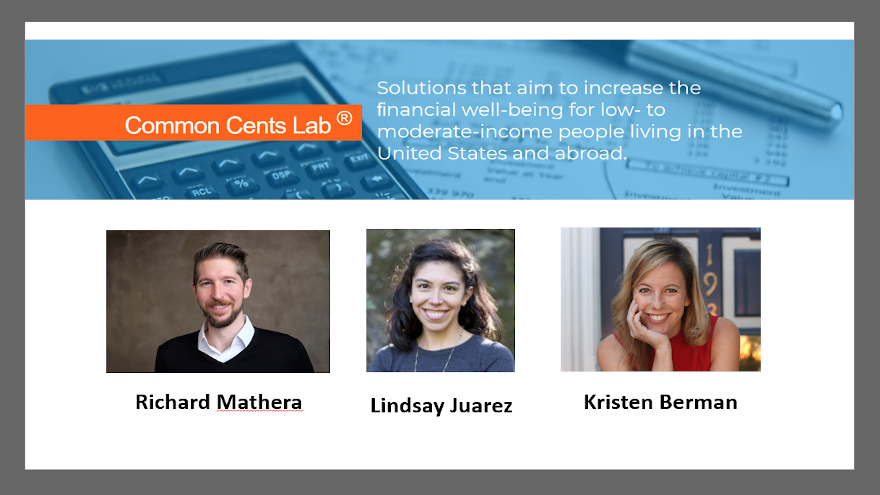COMMENTARY: Simple, effective behavioral-based move to reduce default rates

Richard Mathera, Lindsay Juarez and Kristen Berman of the Common Cents Lab at Duke University. Images courtesy of the organization.
By subscribing, you agree to receive communications from Auto Remarketing and our partners in accordance with our Privacy Policy. We may share your information with select partners and sponsors who may contact you about their products and services. You may unsubscribe at any time.
DURHAM, N.C. –
Defaults are a bad outcome for both lenders and borrowers, and research shows that the mismatched timing between a person’s income and their bills is one of the most common reasons for these financial shortfalls.
A new behavioral science experiment conducted by Duke University’s Common Cents Lab with customers of Beneficial State Bank (BSB) shows a simple, creative way that banks can reverse this trend and reduce defaults by eliminating mismatches.
Target smaller, more frequent payments
While banks cannot influence borrower externalities like the loss of a job or a medical emergency that might lead to a missed payment or default, they are better positioned to address income and expense mismatches.
Auto loans in particular can be challenging for income flows because the default monthly payment date is almost always the day a vehicle is purchased. And while loan payments are due on a specific date every month (e.g., the 15th), many people are paid on certain days of the week (e.g., every other Friday).
To help close this gap, a text-able recurring payments form was designed for BSB borrowers so they could sync the autopay of their loans with their income. The experiment randomized over 1,000 new BSB auto loan customers into either a control group or an experimental group. During BSB’s required welcome call for new loan recipients, the experimental group was texted a recurring payments form to help them sync payments with income. The control condition did not get the form.
The form made it easy to make multiple payments because smaller payments often help with budgeting. For example, if a monthly auto loan payment was $397 (the average in the U.S. for a used car), a borrower could choose to do two smaller payments of $198.50. Since millions of people get paid weekly, they could even split it into four weekly payments of $99.25.
Subscribe to Auto Remarketing to stay informed and stay ahead.
By subscribing, you agree to receive communications from Auto Remarketing and our partners in accordance with our Privacy Policy. We may share your information with select partners and sponsors who may contact you about their products and services. You may unsubscribe at any time.
Faster, cheaper payments with no defaults
Importantly, while both the control and experimental groups reported high interest in the program, those in the experimental group who received the enrollment form were 2.3 times as likely to enroll in automatic payments. The members of this group were also more likely to divide their payment into smaller sub-payments that synced with income.
As a result, the experimental group performed far better in terms of defaults, on-time payments, and total payments. None of the members in the experimental group defaulted on their loan while 17 members in the control group defaulted. The synced group also paid sooner — an average of 1.4 days before the due date compared to 2.75 days after the due date for the control group – which meant fewer late fees. And by the study’s conclusion, the experimental group had paid 100% of their loan payments while the control group had paid an average of 94.2% of their total loan payment.
The big opportunity for banks
Small changes in an approach like this — rooted in natural human preference and inclinations — are a highly effective way to positively impact people’s lives. For someone whose income is tight, knowing there will be money in the bank when a loan payment is due makes it easier to confidently sign up for autopay, which can then have additional long-reaching impacts.
When even a single late payment on your car loan can result in late fees and damage to a credit score, autopay can be a tremendous advantage. Not to mention the worst-case scenario of repossession, which can jeopardize a person’s ability to work and earn an income.
At the same time, beyond avoiding missed or late payments, syncing payments can also help to pay off an auto loan faster, a win-win for both the borrower and the lender.
The great news is that building a program to time loan payments with income is an easy one to institute for most banks and lenders. It requires a minimum of time and investment, can be rolled out across multiple loan types and platforms, and produces immediate and obvious bottom-line benefits.
Ultimately, implementing behaviorally informed solutions like these are simple, effective ways to produce good outcomes for everyone involved.
Richard Mathera, Lindsay Juarez, and Kristen Berman are part of the Common Cents Lab at Duke University.


